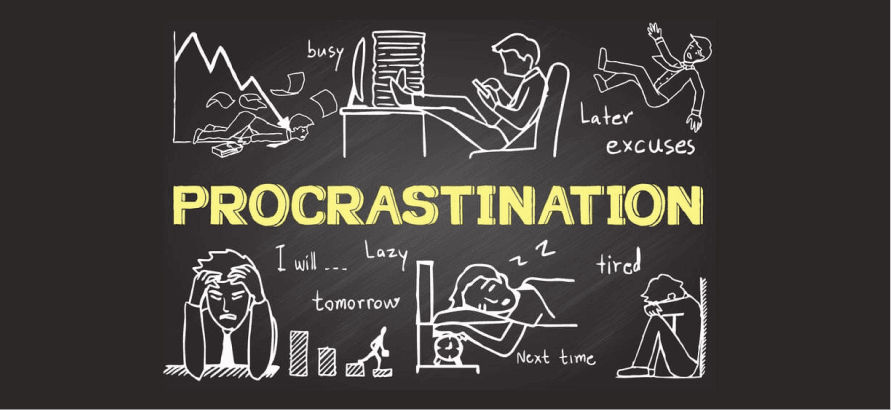Here's why you procrastinate & tactics that will help you stop
Curated from: alifeofproductivity.com
Ideas, facts & insights covering these topics:
12 ideas
·258K reads
1.22K
14
Explore the World's Best Ideas
Join today and uncover 100+ curated journeys from 50+ topics. Unlock access to our mobile app with extensive features.
Why you procrastinate
Procrastination is fundamentally an emotional reaction to what you have to do. The more aversive a task is to you, the more you’ll resist it, and the more likely you are to procrastinate.
Aversive tasks tend to: be boring, frustrating, difficult, lack intrinsic rewards, be ambiguous and unstructured.
6.75K
36.4K reads
Make a task less aversive
When you notice yourself procrastinating, use your procrastination as a trigger to examine a task’s characteristics and think about what you should change.
By breaking down exactly which attributes an aversive task has (boring, frustrating, difficult, meaningless, ambiguous, unstructured), you can take those qualities and turn them around to make the task more appealing to you.
6.81K
28.7K reads
Unproductive responses
... people have when they procrastinate:
- Distracting yourself, and thinking about other things
- Forgetting what you have to do, either actively or passively
- Downplaying the importance of what you have to do
- Focusing on your other values and qualities that will solidify your sense of self
- Denying responsibility to distance yourself from what you have to do
- Seeking out new information that supports your procrastination.
6.4K
25.8K reads
Limit your time
Limiting how much time you spend on a task makes the task more fun, more structured, and less frustrating and difficult because you’ll always be able to see an end in sight.
And instead of throwing more time at the problem, you force yourself to exert more energy over less time to get it done, which will make you a lot more productive.
6.99K
23.4K reads
Be kind to yourself
Be mindful of how kind you are to yourself, and watch out for times when you try to deceive yourself.
The reason you deceive yourself when you procrastinate: at the same time that you know you should be doing something, a different part of you is very much aware that you’re not actually doing it, so you make up a story about why you’re not getting that thing done.
5.55K
19.2K reads
Just get started
You just need enough motivation to get started. Once we start a task, it is rarely as bad as we think: your attributions of the task change, and what you think about yourself changes, too.
For example, to go for a swim in a cold pool, you just need to be motivated for the 30 seconds it takes you to jump in and start swimming.
6.11K
18.1K reads
The costs of procrastinating
Activating the rational part of your brain to identify the costs of procrastinating is a great strategy to get unstuck.
So make a list of the tasks you’re procrastinating on, and then note how your procrastination has affected you in terms of things such as your happiness, stress, health, finances, relationships, and so on.
6.26K
18K reads
Think about your future-self
Research has shown that we have the tendency to treat our future-selves like complete strangers, and that’s why we give them the same kind of load that we’d give a stranger.
5.82K
18.5K reads
We’re not very good at predicting how we will feel in the future. We are overly optimistic, and our optimism comes crashing down when tomorrow comes. When our mood sours, we end up giving in to feel good. We procrastinate.
TIM PYCHYL
5.39K
20.1K reads
Disconnect from the Internet
47% of people’s time online is spent procrastinating, so our best tools for productivity (computers, smartphones) are potentially also one of our greatest time wasters.
To get something done, we need to disconnect from potential distractions like social-networking tools.
5.54K
17.2K reads
Form “implementation intentions”
Especially for tasks that are not defined and poorly structured.
This means thinking about when, where, and how you’re going to do them. Move from broad goal intentions to specific implementation intentions.
5.24K
17.1K reads
Seek out more meaningful work
You procrastinate a lot less with meaningful tasks that are intrinsically rewarding.
In every job, there are going to be tasks you find aversive, but when you constantly find yourself procrastinating because your work is aversive, there may be other jobs that are more aligned to your passions, that you will be much more motivated and productive in.
5.04K
15.8K reads
IDEAS CURATED BY
Always appreciate the time you get, because you never know how much longer it`ll last.
Brantley 's ideas are part of this journey:
Learn more about timemanagement with this collection
Cultivating self-awareness and self-reflection
Prioritizing and setting boundaries for self-care
Practicing mindfulness and presence
Related collections
Similar ideas
Read & Learn
20x Faster
without
deepstash
with
deepstash
with
deepstash
Personalized microlearning
—
100+ Learning Journeys
—
Access to 200,000+ ideas
—
Access to the mobile app
—
Unlimited idea saving
—
—
Unlimited history
—
—
Unlimited listening to ideas
—
—
Downloading & offline access
—
—
Supercharge your mind with one idea per day
Enter your email and spend 1 minute every day to learn something new.
I agree to receive email updates


